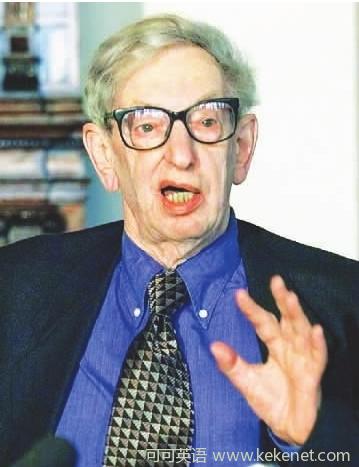(单词翻译:单击)

Ayear or so ago, the journalist Nick Cohen, reviewing a book by the English Marxist historian Eric Hobsbawm, made the mistake of guessing what Hobsbawm's obituaries would look like. Those who shared Hobsbawm's political commitments would laud his work, Mr Cohen predicted. Those who did not would say "his loyalty to totalitarianism disfigured his writing". There would be little agreement between the two camps.
大约一年前,在点评英国马克思主义史学家埃里克•霍布斯鲍姆(Eric Hobsbawm)写的一本书时,记者尼克•科恩(Nick Cohen)曾猜测霍布斯鲍姆的讣告会是什么样子。科恩预言道,政治信仰与霍布斯鲍姆相同的人士会在讣告中赞美他的工作,而与霍布斯鲍姆持不同政见的人士可能会说,"他对极权主义的忠诚使他的作品变得丑陋"——这两个阵营对他的评价会非常不同。
Hobsbawm died last week at the age of 95 and Mr Cohen turns out to have been wrong. Whatever the view in recent years, there is today a remarkable consensus about Hobsbawm. Almost no one makes big claims for the communism that he professed, but almost no one dissents, either, from the view that places him among the great historians of his time.
上周,95岁的霍布斯鲍姆去世了,而事实也证明,科恩的预言是错误的。不管近些年来的思潮如何,今天人们对霍布斯鲍姆的评价却是惊人的一致。尽管几乎没什么人极力主张他所信仰的共产主义,但与此同时,也几乎没什么人反对将他列为他所处的那个时代的伟大史学家。
No matter how loudly Hobsbawm proclaimed the communist dogma, his cast of mind was independent. It was too independent for the Soviet Union, which translated none of his sweeping narratives on nationalism, industrialism, imperialism and globalism. Whether or not Hobsbawm is considered a radical communist, he was an impenitent communist. He clung to his party card through the invasions of Czechoslovakia and Hungary, and past the fall of the Berlin Wall. He was sometimes biased. He blamed the liberal democracies for Stalin's decision to ally himself with Hitler.
不管霍布斯鲍姆曾经多么大声地宣扬共产主义教条,他的思想都称得上独立。而对苏联来说,霍布斯鲍姆的思想显得过于独立,因此,虽然他撰写了许多关于民族主义、工业主义、帝国主义以及全球主义的影响深远的论述,苏联却一篇也没有翻译。不管霍布斯鲍姆算不算得上是激进的共产主义者,他都肯定算得上是顽固的共产主义者。即便在苏联入侵捷克斯洛伐克和匈牙利的时候,即便在柏林墙倒塌之后,他也紧握他的党证不放。他的看法有时会有些偏激。比如斯大林(Stalin)决定与希特勒(Hitler)结盟一事,他就把这件事的责任记在自由民主国家头上。
That Hobsbawm "whitewashed" the crimes of communism is largely a canard. In The Age of Extremes, he suggested that the deaths due to Stalinist terror are more likely "measured in eight rather than seven digits. In these circumstances it does not much matter whether we opt for a ‘conservative' estimate nearer to 10 than to 20 millions or a larger figure: none can be anything but shameful and beyond palliation, let alone justification". Short of abandoning history for autobiography, he could hardly go further.
有人说霍布斯鲍姆试图掩饰共产主义的罪行,这种说法在很大程度上是谣言。他在《极端的年代》(The Age of Extremes)一书中指出,斯大林主义恐怖导致的死亡人数更有可能"是8位数,而不是7位数。在这种情况下,我们是选择一个接近于1000万人、而不是接近于2000万人的‘保守'估计数字,还是选择一个更大的数字,实际上并无太大区别:它无论如何都是一个不光彩的数字,不可能让人感到宽慰、更别说成为谁的辩护理由了。"
People can differ on whether Hobsbawm's Marxism should matter to his reputation. He thought it should. "Without Marx I would not have developed any special interest in history," Hobsbawm wrote in 1997. He refused to apologise for his politics or to couch them in any kind of soft-minded evasion about "good intentions". That he defended a cruel and misguided project did not mean he was misguided about everything.
至于霍布斯鲍姆的马克思主义信仰对他的声望有没有影响,人们有着各种不同的看法。霍布斯鲍姆自己认为是有影响的。1997年他写道:"没有马克思的话,我对历史就不会产生特别的兴趣。"霍布斯鲍姆拒绝为自己的政治观点道歉或以任何形式的关于"善意"的软性借口来表述它们。不过,他为一个残酷而受到误导的事业辩护,并不等于他对所有事情的看法都受到了误导。
Hobsbawm's assertion in Nations and Nationalism (1990) that traditional nationalism was losing its hold on the loyalty of citizens was much ridiculed when the war in Yugoslavia began months later. But today he looks more right than wrong.
在1990年出版的《民族与民族主义》(Nations and Nationalism)一书中,霍布斯鲍姆断言传统的民族主义对公民忠诚度的掌控力正在减弱。几个月后南斯拉夫内战爆发时,他的这一观点受到了很多人的嘲笑。但今天看来,他的观点更有可能是对的而不是错的。
His scepticism about democracy was not to most official tastes, but only by ignoring the data could one dispute his contention that both Colombia and the US were countries with well-functioning democracies and high murder rates. "Even as an alternative to other systems," he wrote of democracy, "it can be defended only with a sigh." That elegant, 19th-century-style sentence gives us a clue to why Hobsbawm is beloved even of those who do not share his politics.
霍布斯鲍姆对民主的怀疑态度不合大多数政府的胃口,但对于他提出的一个论点——即哥伦比亚和美国都是民主制度运行良好而谋杀率都很高的国家——只有对数据视而不见的人才会质疑。关于民主制度他曾写道:"即使是作为其他制度的替代品,若想为民主制度辩护,也只能报以一声长叹。"这些19世纪风格的优雅语句也许可以告诉我们,为什么就连那些与他政见不同的人士也对他钟爱有加。
That a historian subscribes to a political ideology does not make him a politician, any more than a historian who professes a religion is necessarily a priest. If there is a mystery here it is why so many artists and writers should have been drawn to the materialistic, mechanistic doctrines of Marxism rather than to more individualistic creeds. How did Victor Jara or Gabriel García Márquez wind up thinking it worthwhile to fight for collectivism? Hobsbawm himself was interested in such questions. He wondered, for instance, about his own enthusiasm for detective stories, for instance, which he considered a "deeply conservative genre". More than most historians, Hobsbawm cared about culture. He wrote excellent jazz criticism, never stopped reading novels and made occasional observations in print about high fashion. Hobsbawm had a clear idea of where his appeal lay. "I try out my books first as student lecture courses," he wrote in 2003, "because lecturing is a good way of testing whether a historian holds his audience."
正如信仰宗教的史学家未必就是一名神职人员,认同某种政治意识形态的史学家也不一定会成为政客。如果说这里有什么令人奇怪的地方,那就是为什么会有如此之多的艺术家与作家会被马克思主义唯物、机械的教条吸引,而不是被个人主义色彩更浓的信仰吸引。为什么维克多•哈拉(Victor Jara)与加布里埃尔•加西亚•马尔克斯(Gabriel García Márquez)最终会认为为集体主义斗争是值得的?霍布斯鲍姆本人对这类问题也很感兴趣。比如,他很想知道自己为什么会痴迷于侦探小说这类他认为属于"极端保守体裁"的作品。他对文化的关注也强于多数史学家。他写过极好的爵士乐评论,而且从未中断过小说阅读,偶尔还会写些高级时装评论。霍布斯鲍姆清楚自己的吸引力在哪里。2003年他曾写道:"我会把我写的书首先拿到课堂上讲给学生听,因为讲课是测试一位史学家能否吸引住听众的好办法。"
History is a branch of literature, not of science, although, like all literature, it draws much of its strength from the "scientific" ability to perceive patterns, discard falsehoods and draw conclusions. The Marxist historian may believe devoutly in what Marx said of philosophy: "The philosophers have only interpreted the world, in various ways; the point is to change it." But in practice history is often more like poetry as W.H. Auden describes it, a discipline that "makes nothing happen". Both world views characterise Hobsbawm, who wrote in the preface to his 1997 essay collection On History that facts provide "the point from which historians must start, however far from it they may end".
历史学是文学的一个分支,而不是科学的分支——尽管像各种文学一样,历史学也从感知模式、去伪存真和作出结论等"科学"能力中获得生命力。马克思主义史学家也许笃信马克思说的关于哲学的那句话:"哲学家们只是用不同的方式解释世界,而问题在于改变世界。"但实际上,正如W•H•奥登(W.H. Auden)所描述的那样,历史学可能更像诗歌,是一种"什么都做不了"的学科。霍布斯鲍姆的独特之处在于他同时拥有这两种世界观。他在自己1997年的文集《论历史》(On History)的序言中写道,"史学家必须以(事实)为起点,无论他们最终会走多远"。


